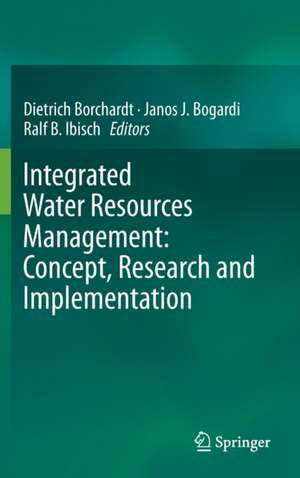Integrated Water Resources Management: Concept, Research and Implementation
Editat de Dietrich Borchardt, Janos J. Bogardi, Ralf B. Ibischen Limba Engleză Hardback – 29 apr 2016
| Toate formatele și edițiile | Preț | Express |
|---|---|---|
| Paperback (1) | 1240.47 lei 6-8 săpt. | |
| Springer International Publishing – 22 apr 2018 | 1240.47 lei 6-8 săpt. | |
| Hardback (1) | 1247.09 lei 6-8 săpt. | |
| Springer International Publishing – 29 apr 2016 | 1247.09 lei 6-8 săpt. |
Preț: 1247.09 lei
Preț vechi: 1520.84 lei
-18% Nou
Puncte Express: 1871
Preț estimativ în valută:
238.66€ • 248.25$ • 197.03£
238.66€ • 248.25$ • 197.03£
Carte tipărită la comandă
Livrare economică 15-29 aprilie
Preluare comenzi: 021 569.72.76
Specificații
ISBN-13: 9783319250694
ISBN-10: 3319250698
Pagini: 781
Ilustrații: XV, 781 p. 227 illus., 199 illus. in color.
Dimensiuni: 155 x 235 x 43 mm
Greutate: 1.29 kg
Ediția:1st ed. 2016
Editura: Springer International Publishing
Colecția Springer
Locul publicării:Cham, Switzerland
ISBN-10: 3319250698
Pagini: 781
Ilustrații: XV, 781 p. 227 illus., 199 illus. in color.
Dimensiuni: 155 x 235 x 43 mm
Greutate: 1.29 kg
Ediția:1st ed. 2016
Editura: Springer International Publishing
Colecția Springer
Locul publicării:Cham, Switzerland
Cuprins
Part I Introduction.- 1 Integrated Water Resources Management: Concept, Research and Implementation.- Part II Water resources assessments.- 2 Water management in a complex hydrological basin - Application of Water Evaluation and Planning Tool (WEAP) to the Lake Kinneret watershed, Israel.- 3 Assessment of Anthropogenic Impact on the Environmental Flows of Semi-Arid Watersheds: TheCase Study of the Lower Jordan River.- 4 New tools for coherent information base for IWRM in arid regions: the Upper Mega Aquifer System on the Arabian.- 5 Multidisciplinary investigations of the transboundary Dead Sea basin and its water resources.- 6 The impact of rainfall-runoff events on the water quality of the upper catchment of the Jordan River, Israel.- 7 Input-output model-based water footprint indicators to support IWRM in the irrigated drylands of Uzbekistan, Central Asia.- Part III Climate Change.- 8 Climate Change information for IWRM.- Part IV Water Governance.- 9 IWRM in Uzbekistan: A global concept with local consequences.- 10 Water scarcity impacts and challenges of water governance in the Guanting Basin, North China. Evidence from interviews with local stakeholders.- 11 Addressing Water Conflicts through Context-specific In
stitutional Analysis: a Handbook for Research Projects and Programmes.- Part V Public information and participation.- 12 Participative scenario development as a method to integrate science and IWRM – Lessons learnt from a case study in the Jordan River region.- 13 Benefits and Barriers of Participation: Experiences of Applied Research Projects in Integrated Water Resources.- Part VI Capacity Development.- 14 Capacity Development for Integrated Water Resources Management: Lessons learned from applied research projects.- Part VII Water knowledge, information management and decision support.- 15 A Water related Information System for the Sustainable Development of the Mekong Delta: Experiences of the German-Vietnamese WISDOM Project.- 16 Analysing stakeholder driven scenarios with a transboundary water planning tool for IWRM in the Jordan River basin.- 17 Decision Support in the context of IWRM: Lessons learnt from research projects in developing and emerging countries.- Part VIII Integrated land and water resources management.- 18 The use of treated wastewater for irrigation as a component of Integrated Water Resources Management: Reducing environmental implications on soil and groundwater by evaluating site-specific soil suitabilities.- 19 Agriculture in Mongolia under pressure of agronomic nutrient imbalances and food security demands: A case study of stakeholder participation for future nutrient and water resource management.- 20 WebGIS-based approach to simulate water and solute fluxes in the Miyun basin in China.- 21 Dynamic Land Use Change as Challenge for IWRM: a Case Study in Central Brazil.- Part IX Regional case studies and pathways to sustainable water management.- 22 Reconceptualising Water Management in Khorezm, Uzbekistan Recommendations towards IWRM.- 23 Integrated Water Resource Management in Isfahan: The Zayandeh Rud Catchment.- 24 Overall-effective measures for sustainable water resources management in the coastal area of Shandong Province, PR China.- 25 Modular Concept for Municipal Water Management in the Kharaa River Basin, Mongolia.- 26 From the Concept to the Tap – Integrated Water Resources Management in Northern Namibia.- Part X Transboundary case studies.- 27 Sustainable Water and Land Management under Global Change - The GLOWA Jordan River Project.- 28 Challenges of implementing IWRM in the Lower Jordan Valley.
stitutional Analysis: a Handbook for Research Projects and Programmes.- Part V Public information and participation.- 12 Participative scenario development as a method to integrate science and IWRM – Lessons learnt from a case study in the Jordan River region.- 13 Benefits and Barriers of Participation: Experiences of Applied Research Projects in Integrated Water Resources.- Part VI Capacity Development.- 14 Capacity Development for Integrated Water Resources Management: Lessons learned from applied research projects.- Part VII Water knowledge, information management and decision support.- 15 A Water related Information System for the Sustainable Development of the Mekong Delta: Experiences of the German-Vietnamese WISDOM Project.- 16 Analysing stakeholder driven scenarios with a transboundary water planning tool for IWRM in the Jordan River basin.- 17 Decision Support in the context of IWRM: Lessons learnt from research projects in developing and emerging countries.- Part VIII Integrated land and water resources management.- 18 The use of treated wastewater for irrigation as a component of Integrated Water Resources Management: Reducing environmental implications on soil and groundwater by evaluating site-specific soil suitabilities.- 19 Agriculture in Mongolia under pressure of agronomic nutrient imbalances and food security demands: A case study of stakeholder participation for future nutrient and water resource management.- 20 WebGIS-based approach to simulate water and solute fluxes in the Miyun basin in China.- 21 Dynamic Land Use Change as Challenge for IWRM: a Case Study in Central Brazil.- Part IX Regional case studies and pathways to sustainable water management.- 22 Reconceptualising Water Management in Khorezm, Uzbekistan Recommendations towards IWRM.- 23 Integrated Water Resource Management in Isfahan: The Zayandeh Rud Catchment.- 24 Overall-effective measures for sustainable water resources management in the coastal area of Shandong Province, PR China.- 25 Modular Concept for Municipal Water Management in the Kharaa River Basin, Mongolia.- 26 From the Concept to the Tap – Integrated Water Resources Management in Northern Namibia.- Part X Transboundary case studies.- 27 Sustainable Water and Land Management under Global Change - The GLOWA Jordan River Project.- 28 Challenges of implementing IWRM in the Lower Jordan Valley.
Notă biografică
Dietrich Borchardt, Helmholtz Centre for Environmental Research, Magdeburg, Germany; Janos J. Bogardi, University of Bonn, Germany; Ralf B. Ibisch, Helmholtz Centre for Environmental Research, Magdeburg, Germany
Textul de pe ultima copertă
This book reviews the concept, contemporary research efforts and the implementation of Integrated Water Resources Management (IWRM). The IWRM concept was established as an international guiding water management paradigm in the early 1990ies and has become a vital approach to solving the problems associated with the topic of water. The book summarizes fourteen comprehensive IWRM research projects with worldwide coverage and analyses their motivations, settings, approaches and implementation of results. Aiming to be an up-to-date interdisciplinary scientific reference, this book provides a comprehensive theoretical and empirical analysis of contemporary IWRM research, examples of science based implementations and a synthesis of the lessons learnt. It concludes with some major future challenges, the solving of which will further strengthen the IWRM concept.
Caracteristici
Will present results of a series of research and implementation projects funded by the German Federal Ministry of Education and Research (BMBF) Will be the first compendium of German research findings in the field of IWRM Will offer practical approaches to solving problems associated with the topic of water management Includes supplementary material: sn.pub/extras















